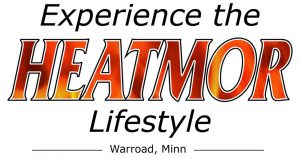Q: How much does a HEATMOR® Outdoor Furnace cost?
A: Manufacturer Suggested Retail Prices (US Funds): Please contact your local dealer for prices in your area.
Q: What colors options are available?
A: HEATMOR® has 20 different color choices! This allows you to have an attractive furnace that complements the color scheme of existing buildings such as your home, garage, shop etc.
Q: What type of warranty does HEATMOR® provide?
A: Most warranties, no matter how many years of coverage they provide, are only good as long as certain “conditions” or maintenance procedures are adhered to. HEATMOR® provides you with an “unconditional” warranty on defects in materials and workmanship as well as corrosion. As long as you operate your furnace in accordance with the safety guide lines set forth in the owners manual, your limited lifetime warranty is intact. For more information, click here.
Q: Why does HEATMOR® manufacture only stainless steel outdoor wood furnaces?
A: HEATMOR® uses stainless steel in the construction of their outdoor wood furnaces because it is proven to last up to 3 times longer than mild steel no matter what the gauge is. HEATMOR® pioneered the use of 409 Stainless Steel in outdoor furnaces in 1988 and has set the standard for the industry ever since.
Q: How often do you have to put wood in the furnace?
A: Your Authorized HEATMOR® Dealer will be able to determine your individual heat load and provide you with a furnace that will deliver a minimum burn time of 12 hours.
Q: How often do you clean out the ashes?
A: The HEATMOR® over/under forced air draft makes our furnace more combustion efficient therefore, it produces a very fine ash. Approximately 5-8 gallons of these ashes can be safely and conveniently emptied out the rear of the furnace every 2-3 weeks. (Note: Use a noncombustible container for ash storage.)
Q: How much wood will I use in a season?
A. If you are a previous user of an indoor wood burning furnace or stove, normally your wood consumption with an outdoor furnace will increase approximately 10 percent due to the following reasons:
- The HEATMOR® will become your primary heat source.
- You will be heating your domestic hot water as well as other applications.
- There will be a more even heat distribution.
However, you will no longer have the inconvenience and mess of hauling wood into your home as well as eliminating the smell of smoke in your home and the danger of chimney fires. For those of you that have not experienced the benefits of wood heating, you will find that your wood consumption will vary according to the type of wood you are burning (We recommend seasoned wood) and your individual heating requirements. On average you may use anywhere between 6-10 cords of wood per heating season.
Q: Is this a cost effective method of heating?
A: Yes! If you have your own wood lot, your fuel costs will be processing only. By using the Cost Comparison Chart below and your previous heating bills you can determine your future wood consumption and heating costs.
Q: Is a HEATMOR® capable of running without electricity?
20 different color choices:
Q: Why does HEATMOR® use a semi-closed system?
A: Outdoor wood furnaces operate under three different types of systems:
Closed systems operate a furnace at a psi of 7 or more; therefore it is considered a totally pressurized system. Pressurized systems require much stricter guidelines for installation and operation.
Open systems operate a furnace with direct contact occurring between the outside air and the water in the furnace. This allows oxygen to get into the system and create proper conditions for corrosion and excessive evaporation to occur.
The HEATMOR® bladder system allows little occurrence of evaporation and lessens the introduction of oxygen and other harmful elements. It also allows the use of antifreeze and other coolant enhancement chemicals. Under normal operating conditions, a HEATMOR® will operate at atmospheric pressure (3 psi or less). However, if a malfunction occurs (overheating) the specially designed pop-off valve will allow excess pressure to be relieved to the atmosphere.
Cost Comparison Chart
The amount of heat created or used is measured in BTU’s. An average home uses 100,000,000 BTU’s of total energy for heating per year. This includes 25 percent usage for the heating of domestic hot water. Based on this total consumption, the following amounts of fuel would be required to produce 100,000,000 BTU’s.
Heating Method | BTU’s Per Unit | Annual Requirements | Cost Per Unit | Total Annual Cost |
Electricity | 3,414 kilowatts/hr | 29300 | $0.12 | $3,516 |
Propane | 91,500/gallon | 1,092 | $2.93 | $3,199 |
Fuel Oil | 138,690/gallon | 721 | $4.02 | $2,898 |
Wood (Birch) | 23,400,000/cord | 8.5 | $100.00 | $850 |
Important
*The above prices are in U.S. Funds. Adjust the price per unit to reflect current local costs. The above costs are not standard across the U.S. Actual cost savings may vary depending on effciency of the system. Savings are based on the assumption that you obtain the cord wood at no cost to you (including labor and time spent loading the unit). Savings shown are not a guarantee of annual cost savings. Savings could be more or less.
Q: Can I install a CSS model within the United States?
A: No. Residential installation of this unit is prohibited by law.


